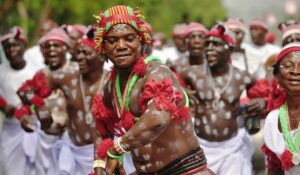By Johnmartins Ochor, Blessing Nweke and Maryann Nwodo
 Photo Credits: Google. Atilogwu dancers during the annual carnival calabar in carlabar cross river state Nigeria
Photo Credits: Google. Atilogwu dancers during the annual carnival calabar in carlabar cross river state Nigeria
Cultural tourism which focuses on the appreciation of cultural heritage, traditions, arts and local customs is one of the major contributors to economic development and growth, globally. Cultural tourism also known as heritage tourism involves the visit to historical sites, festivals, museums, and traditional performances.
It is a powerful tool for promoting and preserving the heritage of a nation., as it enables travelers engage themselves deeply in the traditions and lifestyles of different communities, for better appreciation and understanding of cultural diversity. It plays a significant role in the promotion of national unity and global recognition. But beyond its cultural significance, cultural diversity plays a key in the economic sector. It generates revenue, create employment, and fosters infrastructure development in many nations.
Nigeria is a nation with a vast ethnic diversity and rich cultural heritage, leading cultural tourism destination in Nigeria. In Nigeria, there are different traditional festivals and artistic expressions that attract both the local and international visitors. Some of these include the Osun-Osogbo Sacred Grove in Osun State, the Argungu fishing festival in Kebbi State and other northern states, the Durbar Festival in Kano, as well as the New Yam Festival in the Eastern part of Nigeria (Igbo). All these cultural experiences generate a good economic value by helping to boost local businesses and government revenue.
Moreover, cultural tourism in Nigeria significantly affect the economies by increasing business activities. The visitors or tourists spend a large amount of money on entrance fees, local food, transportations, accommodations, and locally made foods. This in essence, benefits the artisans, the market vendors, transport operators and companies, and those in the business of restaurants, improving livelihoods and reducing unemployment in the country. In the Igbo, indigenes living in diaspora always come back home during the new Yam festivities and they spend money in transportation, among other things.
The Argungu Fishing Festival in Kebbi State which is one of the most famous cultural events in Nigeria also attracts thousands of tourists who always come to witness the fishing competition, the traditional music displays, and the cultural performances. The festival is an important tool of tourism and economic activity in the region and Nigeria at a whole.
Additionally, it creates employment opportunities both directly and indirectly. For example, museum staff, tour guides, the organizers of festivals, artisans, as well as hotel workers, benefit from tourism activities in any particular region of the country. During cultural tourism, local artisans promote their artistic products and make profits.
The government also benefit from cultural tourism. This is through taxes, entry fees, and business permits. When the revenue it generated, it is often reinvested into infrastructure, public services, and cultural promotion and preservation. Cultural tourism is an important non-oil revenue source in Nigeria. It contributes to the state and federal budgets through levies and tourism-related businesses. Other countries like India and Italy with a well developed cultural tourism sectors make good use of their cultural sites to generate foreign exchange earnings.
The cultural tourists need to be accommodated when they visit and this leads to improvement in transportation, roads, airports, and public services. Infrastructure upgrades not only enhance the tourist experience but also benefit local residents by improving accessibility and economic activities. In Nigeria, cities hosting major cultural festivals, such as Kano for the Durbar Festival, often use infrastructural developments to support the influx of visitors.
There’s also been an increased demand for traditional arts, crafts, and local products. Visitors purchase locally made goods such as Adire fabric from Abeokuta, Benin bronze sculptures, and Igbo wood carvings. This demand helps preserve indigenous craftsmanship while providing financial incentives for artisans to continue producing unique cultural items.
Cultural tourism provides economic motivation for communities to maintain and protect their traditions. When it is recognized that native languages, and traditional practices have financial value, local communities are more likely to invest in their preservation. In Nigeria, the renovation of museums, restoration of historical sites, and promotion of cultural festivals have been supported through funds generated from cultural tourism.
For many countries, cultural tourism is a critical sector for diversifying the economy. In Nigeria, where oil has traditionally been the main revenue generator, cultural tourism presents an opportunity to reduce dependency on oil revenues. If cultural tourism is invested on, the government and private sector can create sustainable economic growth and development.
